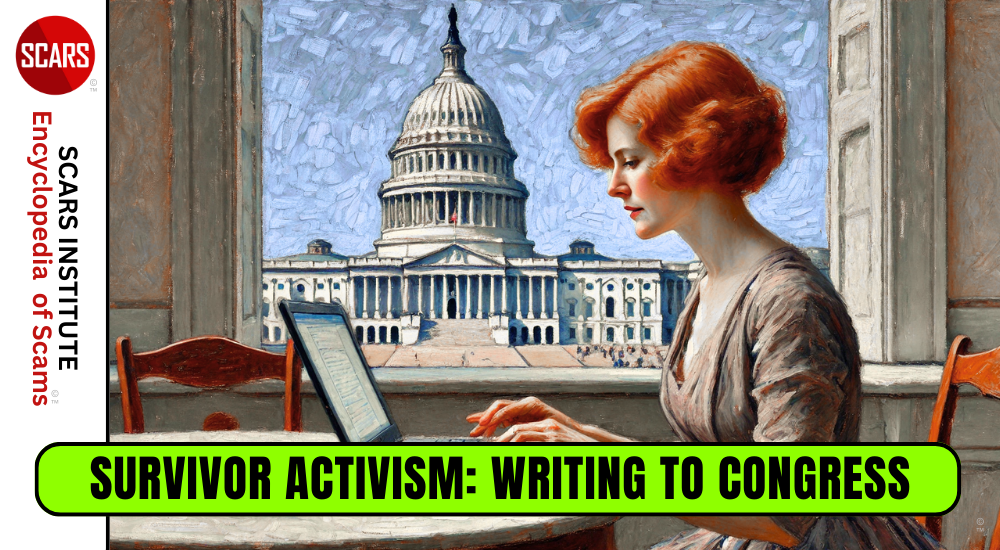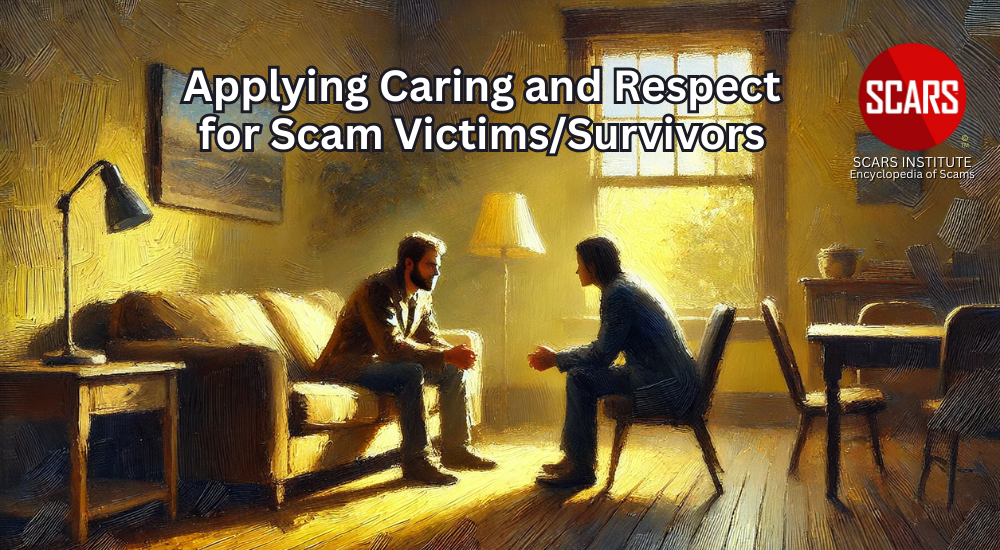
SCARS Institute’s Encyclopedia of Scams™ Published Continuously for 25 Years

Save Victims’ Support Funding In The United States – #VOCAfix
Help Save U.S. Government Crime Victims’ Support Funding Now!
ACT ON JULY 14TH BEFORE IT IS TOO LATE
A SCARS Victims’ Assistance Activism Campaign
Cuts Made By The U.S. Federal Government Are Crippling Victims’ Services
The cuts that the U.S. Government has made to VOCA Crime Victims’ Fund will reduce trauma counseling and victims’ compensation funds that give victims money to help with the emotional and financial recovery of scam victims in the United States.
To Take Action Now – click here!
Deposits into the Crime Victims Fund have dropped dramatically in the last several years, leading to a substantial cut to VOCA victim assistance grants.
As a result, victim services organizations like ours are facing budget cuts, staff layoffs, and even program closures while the demand for victim services is growing as never before.
This July 14th we are asking for your help in asking U.S. Senator Schumer to bring the VOCA Fix legislation to the Floor of the U.S. Senate for a vote before the August recess.
How can you help?
Call and tweet your Senators and Senator Schumer!
Here are example Tweets:
- “Don’t leave for recess and leave crime victims behind! Bring the House-passed #VOCAFix to the floor of the U.S. Senate with no amendments. There’s a #Crisis4Victims”
- “With each day that passes, millions of dollars are left on the table that could help solve the #Crisis4Victims.”
- “Over 1,710 advocates have asked for the #VOCAFix as is. Thank you for sponsoring this legislation. Please bring the House-passed bill to the Floor immediately for a vote.”
Please copy and share everywhere!
Background Information
As we as a nation are pulling out all of the stops to address and recover from the COVID-19 pandemic and the associated public health crisis, we are simultaneously turning our backs on people impacted by long-standing, pervasive public health epidemics – financial fraud, domestic violence, child abuse, sexual assault, trafficking, and other forms of interpersonal violence & crime.
Victims of crime are facing potentially catastrophic cuts to funding for programs that serve them, and the Senate must take immediate action to protect grant funding for victim services by immediately passing the bipartisan, bicameral VOCA Fix to Sustain the Crime Victims Fund Act of 2021 (“the VOCA Fix Act”).
The U.S. Victims of Crime Act (VOCA) grants are the largest source of federal funding for victim service organizations. These grants are drawn from the Crime Victims Fund (“CVF” or “the Fund”), which comprises monetary penalties associated with federal criminal convictions; VOCA grants are NOT funded by taxpayers! They are funded by criminals! They can be used to serve survivors of all crimes. VOCA also supports state victim compensation by matching 60% of states’ victim compensation funds.
The CVF is like a bank account with deposits and withdrawals.
In the past, when deposits were high, Congress was able to withdraw money to fund victim service grants while also leaving some in its ‘savings account’ as a backstop for lean years. However, even the most robust ‘savings account’ will run out if more money is withdrawals exceed deposits. That is the situation in which we find ourselves. The balance in the ‘savings account’ has decreased by 70% since the end of 2017.
Deposits into the Fund are the lowest they’ve been since the early 2000s, and Congress has also pulled from the Fund’s savings. But since they also will need to draw on these savings in future years, they have had to cut victim service grants to avoid emptying the CVF entirely.
The historically low deposits into the CVF are, in large part, are the result of the Department of Justice’s prosecutorial decisions, particularly in white-collar criminal cases. Instead of prosecuting, they are entering into deferred prosecution and non-prosecution agreements. Monetary penalties associated with these agreements go into the General Treasury instead of the Crime Victims Fund. The underlying crime is the same, but survivors do not benefit from that money – more than $7 billion over the last three years and $2.5 billion since January 1 of this year.
The solution is simple: pass the VOCA Fix Act to change the law so that monetary penalties associated with deferred and non-prosecution agreements go into the Crime Victims Fund also. It’s a common-sense solution that has broad bipartisan, bicameral support. And it can’t wait! Every day that goes by without this deposits fix is a day that crime victims and the programs that serve them are denied critical funding – victims have already lost $500 million this year alone. The House of Representatives passed the VOCA Fix Act by a margin of 384 – 38 two-and-a-half months ago, and it is time for the Senate to step up and follow suit.
*More information about the VOCA Fix to Sustain the Crime Victims Fund Act of 2021 in the form of a letter signed by more than 1,710 organizations and government agencies can be found at https://tinyurl.com/23drue5v.
VOCA Fix Fact Sheet
H.R.1652/S.611: VOCA Fix to Sustain the Crime Victims Fund Act of 2021 (“the VOCA Fix Act”)
Dated June 3, 2021
The Basics
Fact: The Victim of Crime Act’s (VOCA) Crime Victims Fund (CVF) is a non-taxpayer source of funding that supports thousands of crime victims services providers serving millions of victims of crime annually and is funded by monetary penalties associated with federal criminal convictions.
Fact: Deposits fluctuate annually based on the cases that the Department of Justice successfully prosecutes.
Fact: Appropriators decide how much to release from the CVF every year. Statutorily, this money funds specific DOJ programs and state victim assistance grants and supplements state victim compensation funds.
Fact: It is important to have money in the CVF to provide a buffer for lean years. Unfortunately, if there are too many lean years in a row, the CVF will not be able to provide that buffer. That is the situation we are currently facing.
Lower Deposits Lead to Cuts in Grants
Fact: Deposits into the CVF are historically low. Deposits the last four years have been $445 million, $495 million, $503 million, and $117 million (as of the end of December) respectively – deposits have not been this low since 2003. This decrease is caused in part by an increase in the use of deferred prosecution and non-prosecution agreements, the monetary penalties associated with which are deposited into the General Treasury rather than the Crime Victims Fund.
Fact: Lower deposits lead to lower releases. Appropriators are justly cautious about depleting the CVF, and they are reluctant to dip too deeply into the buffer the CVF provides, particularly if they do not see indications that the CVF will be replenished.
Fact: The amount coming off the top for non-victim service grants is somewhat static, which means that the cuts to the annual VOCA release disproportionately cut victim service grants. Thus, the percentage cut to victim service grants is larger than the percentage cut to the VOCA release.
Fact: State grants decreased in FY’19, FY’20, and FY’21, reflecting the decreased deposits. If the release was to reflect deposits without drawing down the balance in the CVF to dangerously low levels, assuming no transfers to fund other grants, victim assistance grants to the states could be cut to as little as approximately $200 million annually, only 5% of what went out in FY’18.
The Impact
Fact: States are experiencing enormous cuts to their awards.
Fact: Every state is at a different place in their grant cycles. Most states have either already cut funding to victim service organizations or will do so this coming fiscal year.
Fact: CACs receive between $150 and $200 million in VOCA dollars annually, which is the largest single source of funding for these programs. The cost of serving the more than 371,000 children they helped last year was $614 million. If programs lose 70% of their funding, this would leave a $140 million deficit, equating to about 84,450 children.
Fact: Victim services in Ohio lost $55 million in 2020. Rape crisis programs specifically lost over $7.5 Million, with individual programs losing between 32% and 57% (as well as three 100% cuts) of VOCA funds. This will essentially cut services in half, reducing survivor access to pre-2000 levels.
The Solution
Pass the VOCA Fix Act to increase deposits into the Crime Victims Fund by depositing monetary penalties associated with deferred prosecution and non-prosecution agreements into the CVF as well as monetary penalties associated with convictions.
This is not new spending. It is simply capturing money that would be going into the CVF if these crimes were prosecuted instead of settled.
Congress must also increase the federal contribution to state victim compensation funds by matching 75% of state funds instead of the current 60%.
For more information, see the letter to Congress (https://tinyurl.com/23drue5v), signed by more than 1,700 national, state, tribal, and local organizations and government agencies. The 56 State and Territorial Attorneys General also sent a letter to Congress (https://dojmt.gov/wp-content/uploads/VOCA-Amendments-NAAG-Final-.pdf), addressing some of these same issues.
Why SCARS?
SCARS was unable to sign the letter in time, but SCARS is a full supporter of the #VOCAfix campaign. SCARS is also a crime victims’ assistance provider and is affected by these funding reductions.
We urge all readers to assist in this important campaign to help solve victims’ support funding in the United States.
Click Here to Take Action Now!
-/ 30 /-
What do you think about this?
Please share your thoughts in a comment below!
Table of Contents
LEAVE A COMMENT?
Recent Comments
On Other Articles
- Arwyn Lautenschlager on Love Bombing And How Romance Scam Victims Are Forced To Feel: “I was love bombed to the point that I would do just about anything for the scammer(s). I was told…” Feb 11, 14:24
- on Dani Daniels (Kira Lee Orsag): Another Scammer’s Favorite: “You provide a valuable service! I wish more people knew about it!” Feb 10, 15:05
- on Danielle Delaunay/Danielle Genevieve – Stolen Identity/Stolen Photos – Impersonation Victim UPDATED 2024: “We highly recommend that you simply turn away form the scam and scammers, and focus on the development of a…” Feb 4, 19:47
- on The Art Of Deception: The Fundamental Principals Of Successful Deceptions – 2024: “I experienced many of the deceptive tactics that romance scammers use. I was told various stories of hardship and why…” Feb 4, 15:27
- on Danielle Delaunay/Danielle Genevieve – Stolen Identity/Stolen Photos – Impersonation Victim UPDATED 2024: “Yes, I’m in that exact situation also. “Danielle” has seriously scammed me for 3 years now. “She” (he) doesn’t know…” Feb 4, 14:58
- on An Essay on Justice and Money Recovery – 2026: “you are so right I accidentally clicked on online justice I signed an agreement for 12k upfront but cd only…” Feb 3, 08:16
- on The SCARS Institute Top 50 Celebrity Impersonation Scams – 2025: “Quora has had visits from scammers pretending to be Keanu Reeves and Paul McCartney in 2025 and 2026.” Jan 27, 17:45
- on Scam Victims Should Limit Their Exposure To Scam News & Scammer Photos: “I used to look at scammers photos all the time; however, I don’t feel the need to do it anymore.…” Jan 26, 23:19
- on After A Scam, No One Can Tell You How You Will React: “This article was very informative, my scams happened 5 years ago; however, l do remember several of those emotions and/or…” Jan 23, 17:17
- on Situational Awareness and How Trauma Makes Scam Victims Less Safe – 2024: “I need to be more observant and I am practicing situational awareness. I’m saving this article to remind me of…” Jan 21, 22:55
ARTICLE META
Important Information for New Scam Victims
- Please visit www.ScamVictimsSupport.org – a SCARS Website for New Scam Victims & Sextortion Victims
- Enroll in FREE SCARS Scam Survivor’s School now at www.SCARSeducation.org
- Please visit www.ScamPsychology.org – to more fully understand the psychological concepts involved in scams and scam victim recovery
If you are looking for local trauma counselors please visit counseling.AgainstScams.org or join SCARS for our counseling/therapy benefit: membership.AgainstScams.org
If you need to speak with someone now, you can dial 988 or find phone numbers for crisis hotlines all around the world here: www.opencounseling.com/suicide-hotlines
A Note About Labeling!
We often use the term ‘scam victim’ in our articles, but this is a convenience to help those searching for information in search engines like Google. It is just a convenience and has no deeper meaning. If you have come through such an experience, YOU are a Survivor! It was not your fault. You are not alone! Axios!
A Question of Trust
At the SCARS Institute, we invite you to do your own research on the topics we speak about and publish, Our team investigates the subject being discussed, especially when it comes to understanding the scam victims-survivors experience. You can do Google searches but in many cases, you will have to wade through scientific papers and studies. However, remember that biases and perspectives matter and influence the outcome. Regardless, we encourage you to explore these topics as thoroughly as you can for your own awareness.
Statement About Victim Blaming
SCARS Institute articles examine different aspects of the scam victim experience, as well as those who may have been secondary victims. This work focuses on understanding victimization through the science of victimology, including common psychological and behavioral responses. The purpose is to help victims and survivors understand why these crimes occurred, reduce shame and self-blame, strengthen recovery programs and victim opportunities, and lower the risk of future victimization.
At times, these discussions may sound uncomfortable, overwhelming, or may be mistaken for blame. They are not. Scam victims are never blamed. Our goal is to explain the mechanisms of deception and the human responses that scammers exploit, and the processes that occur after the scam ends, so victims can better understand what happened to them and why it felt convincing at the time, and what the path looks like going forward.
Articles that address the psychology, neurology, physiology, and other characteristics of scams and the victim experience recognize that all people share cognitive and emotional traits that can be manipulated under the right conditions. These characteristics are not flaws. They are normal human functions that criminals deliberately exploit. Victims typically have little awareness of these mechanisms while a scam is unfolding and a very limited ability to control them. Awareness often comes only after the harm has occurred.
By explaining these processes, these articles help victims make sense of their experiences, understand common post-scam reactions, and identify ways to protect themselves moving forward. This knowledge supports recovery by replacing confusion and self-blame with clarity, context, and self-compassion.
Additional educational material on these topics is available at ScamPsychology.org – ScamsNOW.com and other SCARS Institute websites.
Psychology Disclaimer:
All articles about psychology and the human brain on this website are for information & education only
The information provided in this article is intended for educational and self-help purposes only and should not be construed as a substitute for professional therapy or counseling.
While any self-help techniques outlined herein may be beneficial for scam victims seeking to recover from their experience and move towards recovery, it is important to consult with a qualified mental health professional before initiating any course of action. Each individual’s experience and needs are unique, and what works for one person may not be suitable for another.
Additionally, any approach may not be appropriate for individuals with certain pre-existing mental health conditions or trauma histories. It is advisable to seek guidance from a licensed therapist or counselor who can provide personalized support, guidance, and treatment tailored to your specific needs.
If you are experiencing significant distress or emotional difficulties related to a scam or other traumatic event, please consult your doctor or mental health provider for appropriate care and support.
Also read our SCARS Institute Statement about Professional Care for Scam Victims – click here to go to our ScamsNOW.com website.


![Save Victims' Support Funding In The United States - #VOCAfix - URGENT ACTION NEEDED - Part 1 [Updated - Success] VOVAfix Action VOVAfix-Action](https://romancescamsnow.com/wp-content/uploads/2021/07/VOVAfix-Action.png)
![Save Victims' Support Funding In The United States - #VOCAfix - URGENT ACTION NEEDED - Part 1 [Updated - Success] Refugee Romance Scams Refugee-Romance-Scams](https://romancescamsnow.com/wp-content/uploads/2021/07/Refugee-Romance-Scams.png)
![Save Victims' Support Funding In The United States - #VOCAfix - URGENT ACTION NEEDED - Part 1 [Updated - Success] Save Victims Support Funding In The United States VOCAfix URGENT ACTION NEEDED Save Victims' Support Funding In The United States - #VOCAfix - URGENT ACTION NEEDED - Part 1 [Updated - Success] Save Victims Support Funding In The United States VOCAfix URGENT ACTION NEEDED](https://romancescamsnow.com/wp-content/uploads/2021/07/Save-Victims-Support-Funding-In-The-United-States-VOCAfix-URGENT-ACTION-NEEDED.png)
![Save Victims' Support Funding In The United States - #VOCAfix - URGENT ACTION NEEDED - Part 1 [Updated - Success] come and join 2 SCARS Institute Scam Survivor's Community portal banner](https://romancescamsnow.com/wp-content/uploads/2025/12/come-and-join-2.png)






![Save Victims' Support Funding In The United States - #VOCAfix - URGENT ACTION NEEDED - Part 1 [Updated - Success] SCARS CDN REPORT SCAMEMRS HERE e1697414569935 SCARS-CDN-REPORT-SCAMEMRS-HERE](https://romancescamsnow.com/wp-content/uploads/2018/12/SCARS-CDN-REPORT-SCAMEMRS-HERE-e1697414569935.png?_t=1697414571)
![Save Victims' Support Funding In The United States - #VOCAfix - URGENT ACTION NEEDED - Part 1 [Updated - Success] NavyLogo@4x 81 U.S. & Canada Suicide Lifeline 988](https://romancescamsnow.com/wp-content/uploads/2023/06/NavyLogo@4x-81.png)

![Save Victims' Support Funding In The United States - #VOCAfix - URGENT ACTION NEEDED - Part 1 [Updated - Success] niprc1.png1 150x1501 11 Save Victims' Support Funding In The United States - #VOCAfix - URGENT ACTION NEEDED - Part 1 [Updated - Success] niprc1.png1 150x1501 11](https://scamsnow.com/wp-content/uploads/2025/04/niprc1.png1_-150x1501-11.webp)
Thank you for your comment. You may receive an email to follow up. We never share your data with marketers.